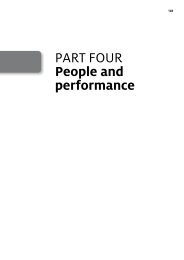The growing business handbook : inspiration and advice ... - Sparkler
The growing business handbook : inspiration and advice ... - Sparkler
The growing business handbook : inspiration and advice ... - Sparkler
Create successful ePaper yourself
Turn your PDF publications into a flip-book with our unique Google optimized e-Paper software.
262 Growth capital<br />
I believe there is a benefit in progressing to true partnering. It is something I do see<br />
increasingly happening, however it is not part of the st<strong>and</strong>ard DNA of the finance<br />
department. This is currently outside the comfort zone of finance. We will see a<br />
much wider finance role, but the basis will always be the independent person with<br />
the proper financial background being a specialist on the finances, governance <strong>and</strong><br />
compliance.<br />
Erik ter Horst, Vice President Finance, CFO EMEA <strong>and</strong> Latin America – BT Plc<br />
It is perhaps a step too far for some finance professionals given that they may have<br />
been drawn originally to a role that was at most advisory, <strong>and</strong> also given the nature<br />
of historic professional education <strong>and</strong> training, <strong>and</strong> the potential effects of taking<br />
such a stake on their independence.<br />
<strong>The</strong> importance of roles <strong>and</strong> skills<br />
What is certain is that transformation has not led to the dearth of traditional finance<br />
roles; the finance function continues to provide a full service model with a wide range<br />
of roles. However, the changing interplay of skills <strong>and</strong> competencies is also certain.<br />
Finance professionals now require a mix of technical finance skills as well as<br />
commercial or <strong>business</strong> skills across all roles – albeit in different degrees. A ‘front<br />
office’ finance professional whose duties are <strong>business</strong>-facing in support of other<br />
operating units is likely to spend more time on activities associated with a strategic/<br />
advisory role <strong>and</strong> require a higher interpersonal <strong>and</strong> <strong>business</strong> skill set. <strong>The</strong> time spent<br />
on strategic/advisory activities increase when the front office individual’s duties<br />
mainly relate to other parts of the organization, <strong>and</strong> it also increases in line with their<br />
seniority, reflecting the importance of the strategic/advisory role within the<br />
organization.<br />
Ledgers to leaders: what are the real<br />
skills needed?<br />
Finance professionals at all levels rate their <strong>business</strong> competency as being more<br />
important to their organizations than their technical competency, though the balance<br />
between the two competencies depends on the individual’s role, duties <strong>and</strong> seniority,<br />
<strong>and</strong> on the size of their organizations. But, according to a recent consultation by<br />
CIMA, non-finance senior management continue to rate finance professionals’<br />
technical skills more highly than their <strong>business</strong> skills in terms of the value they add to<br />
the organization. Although organizations rate <strong>business</strong> competency very highly,<br />
technically competent people may hit the ground running, add value from day one,<br />
<strong>and</strong> can then be trained to gain more <strong>business</strong> <strong>and</strong> commercial skills.<br />
But finance professionals require a mix of skills <strong>and</strong> competencies <strong>and</strong> while<br />
technical skills are a critical requirement at the recruitment stage for organizations,<br />
there is definite evidence of a shift in requirements for <strong>business</strong> <strong>and</strong> commercial








